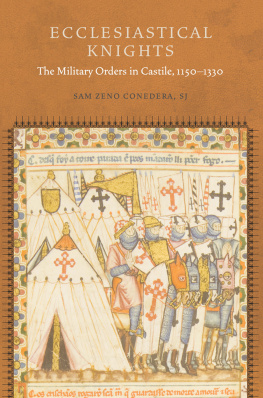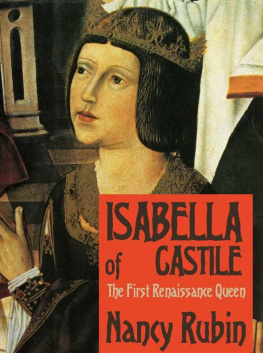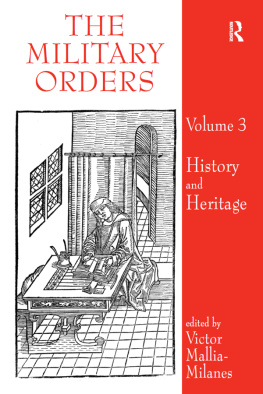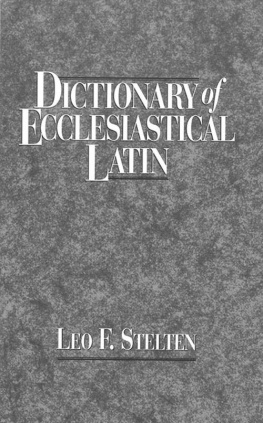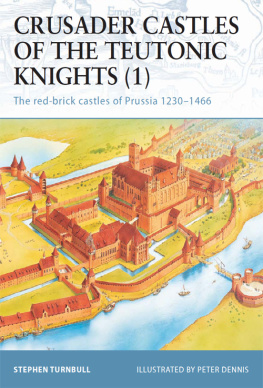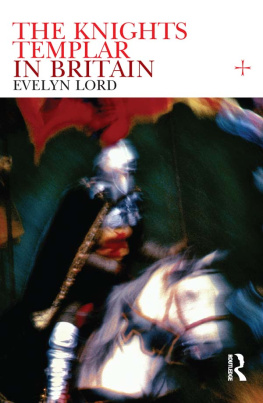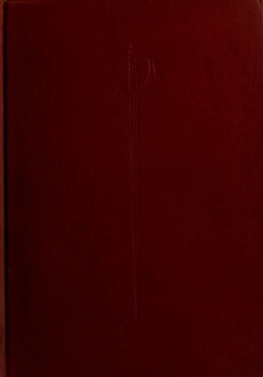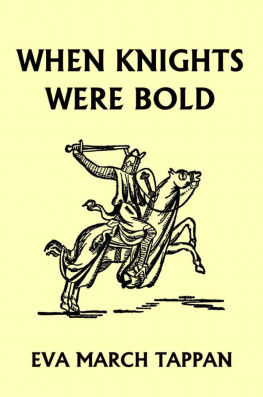Conedera - Ecclesiastical knights: the military orders in Castile, 1150-1330
Here you can read online Conedera - Ecclesiastical knights: the military orders in Castile, 1150-1330 full text of the book (entire story) in english for free. Download pdf and epub, get meaning, cover and reviews about this ebook. City: New York;Castilla y León (Spain);Kastilien;Spain;Castilla y León, year: 2015, publisher: Fordham University Press, genre: Religion. Description of the work, (preface) as well as reviews are available. Best literature library LitArk.com created for fans of good reading and offers a wide selection of genres:
Romance novel
Science fiction
Adventure
Detective
Science
History
Home and family
Prose
Art
Politics
Computer
Non-fiction
Religion
Business
Children
Humor
Choose a favorite category and find really read worthwhile books. Enjoy immersion in the world of imagination, feel the emotions of the characters or learn something new for yourself, make an fascinating discovery.
Ecclesiastical knights: the military orders in Castile, 1150-1330: summary, description and annotation
We offer to read an annotation, description, summary or preface (depends on what the author of the book "Ecclesiastical knights: the military orders in Castile, 1150-1330" wrote himself). If you haven't found the necessary information about the book — write in the comments, we will try to find it.
Conedera: author's other books
Who wrote Ecclesiastical knights: the military orders in Castile, 1150-1330? Find out the surname, the name of the author of the book and a list of all author's works by series.
Ecclesiastical knights: the military orders in Castile, 1150-1330 — read online for free the complete book (whole text) full work
Below is the text of the book, divided by pages. System saving the place of the last page read, allows you to conveniently read the book "Ecclesiastical knights: the military orders in Castile, 1150-1330" online for free, without having to search again every time where you left off. Put a bookmark, and you can go to the page where you finished reading at any time.
Font size:
Interval:
Bookmark:
ECCLESIASTICAL KNIGHTS
FORDHAM SERIES IN MEDIEVAL STUDIES
Mary C. Erler and Franklin T. Harkins, series editors
ECCLESIASTICAL KNIGHTS
The Military Orders in Castile, 11501330
SAM ZENO CONEDERA, SJ
FORDHAM UNIVERSITY PRESS
New York
2015
Copyright 2015 Fordham University Press
All rights reserved. No part of this publication may be reproduced, stored in a retrieval system, or transmitted in any form or by any meanselectronic, mechanical, photocopy, recording, or any otherexcept for brief quotations in printed reviews, without the prior permission of the publisher.
Fordham University Press has no responsibility for the persistence or accuracy of URLs for external or third-party Internet websites referred to in this publication and does not guarantee that any content on such websites is, or will remain, accurate or appropriate.
Fordham University Press also publishes its books in a variety of electronic formats. Some content that appears in print may not be available in electronic books.
Visit us online at www.fordhampress.com.
Library of Congress Cataloging-in-Publication Data
available online at catalog.loc.gov.
Printed in the United States of America
17 16 15 5 4 3 2 1
First edition
Parentibus meis
CONTENTS
One day, while I was doing research for this book, my eyes fell upon these lines from Maurice Keens classic work on chivalry:
In the crusading context, the military ordersthe Temple, the Hospital and the Teutonic and Spanish orderscame to be just that, the strong right arm of the militant church. Their organisation, as reflected in their rules of life, represented a real fusion of ecclesiastical (as opposed to simply Christian) and martial ideals.
The passage put an idea in my head, an idea that has taken some time to work out. What follows is the fruit of my labors.
Ecclesiastical Knights is a spirituality study. The military orders, which emerged on the frontiers of Europe in the twelfth century, have long fascinated general readers and professional historians alike. Some of this fascination is tied up with occult mythology, the manifestations of which are legion in print and film. Worthier of attention, though, is the seemingly incongruous combination of monastic devotion and the practice of warfare into a single form of religious life. Defining, categorizing, and explaining this way of life is a major problem for the historiography of the military orders, one that Riley-Smith has called the elephant in the room. I propose a new name and a new conceptual model for understanding the Iberian military orders, one that better captures how they combined the exercise of arms and the monastic tradition into a single way of life. I hope that this model helps move the scholarly discussion beyond the label warrior monks. But a name or a model alone serves little to illuminate the spirituality of the military orders, which was lived in flesh and blood and the heat of the day. I undertake a detailed study of the military-religious vocation as it was lived out in the Orders of Santiago, Calatrava, and Alcntara in Len-Castile during the first century and a half of their existence.
I would like to thank the people who have helped bring this project to fruition, beginning with Teo Ruiz, Patrick Geary, Kevin Terraciano, and John Dagenais, my professors at UCLA. Carlos de Ayala Martnez and Francisco Garca Serrano provided invaluable assistance and advice while I was in Madrid, and Helen J. Nicholsons painstaking attention to numerous drafts has dramatically improved the final product. I am grateful to the patient and dedicated board and staff of Fordham University Press, especially Franklin Harkins, Mary Erler, and William Cerbone. My fellow Jesuits have provided the necessary permissions, means, and support for the completion of the project, and family, friends, and colleagues have offered encouragement and more than polite interest all the while. A special thanks goes to Santa Clara University and its president Mike Engh, SJ, for the generous production support of this volume. I must recall, finally, the great Robert I. Burns, SJ, to whose scholarship on medieval Iberia I am greatly indebted, and whose departure from this life has been a loss for all who knew him.
This might be a good place to answer a question that is sometimes posed to me about the relationship of my chosen field of study to my state of life. Years ago, I rather abruptly left my doctoral program to enter the Society of Jesus. Some have asked me if studying the military orders led to this decision. Im not sure what the connection is supposed to be. I can say this much: like the members of the military orders, we Jesuits are not monks.
| AHN OOMM | Archivo Histrico Nacional, Seccin de rdenes Militares, Madrid, Spain |
| BA | Ignacio Jos de Ortega y Cotes, Jos Fernndez de Brizuela, and Pedro de Ortega-Ziga y Aranda, eds., Bullarium ordinis militiae de Alcantara, olim sancti Juliani de Pereiro (Madrid: Tipografa Marn, 1761) |
| BC | Ignacio Jos de Ortega y Cotes, Juan Francisco lvarez de Baquedano, and Pedro de Ortega-Ziga y Aranda, eds., Bullarium ordinis militiae de Calatrava (Madrid: Antonio Martn, 1759), reedited by Derek Lomax (Barcelona: El Abir, 1981) |
| BN | Biblioteca Nacional (BN), Madrid, Spain |
| BS | Antonio Francisco Aguado de Crdova, Alfonso Antonio Alemn y Rosales, and Jos Lpez Agurleta, eds., Bullarium equestris ordinis sancti Iacobi de Spatha (Madrid: Typographia Ioannis de Aritzia, 1719) |
| HDRH | Rodrigo Jimnez de Rada, Historia de rebus Hispanie, ed. Juan Fernndez Valverde, Corpus Christianorum Continuatio Mediaevalis 72 (Turnhout: Brepols, 1987) |
| SBO | Jean Leclercq, OSB, H. Rochais, and C. H. Talbot, eds., Sancti Bernardi Opera, 8 vols. (Rome: Editiones Cistercienses, 19571977) |
When asked for a short description of these institutions, many historians fall back on a well-known label: warrior monks.
Luis Garca-Guijarro Ramos
The Iberian military orders way of life from the twelfth to the early fourteenth centuries represented the consecration of knighthood to God in accordance with the ideals of the Gregorian Reform and the crusading movement, with the help of practices and norms taken from the monastic tradition. The exercise of arms and its exigencies were always primary in this hybrid way of life and gave prior form to the selection and ordering of the monastic elements. Thanks to their permanent commitment to holy war through the profession of vows and the practice of religious discipline, the orders offered to the medieval knight the highest possible opportunity to serve God that did not require him to abandon warfare altogether. The men who took this opportunity were not warrior monks, despite the persistent and mistaken use of that term. They were, rather, ecclesiastical knights, or warriors animated by ideals and spiritual currents endorsed by the church hierarchy.
The present inquiry offers a fresh perspective on two difficult and closely related problems concerning the military ordersnamely, definition and spirituality. The union of the seemingly incongruous traditions of knighthood and monasticism into a single type has long fascinated and puzzled observers, whether medieval or modern, and created serious difficulties for classifying the military orders. Some scholars, pointing to the ambiguity and discordance of the sources, have suggested that the search for greater precision is in vain. Similar problems have long bedeviled the effort to understand the orders spirituality, an issue that has been relatively neglected until recently.the early fourteenth century. The new model of ecclesiastical knighthood may help to explain persistent problems in the historiography of other orders, such as the militarization of the Hospital, better than any alternative offered thus far. Last but not least, the present inquiry debunks the warrior monks nomenclature that remains a source of confusion and distortion.
Next pageFont size:
Interval:
Bookmark:
Similar books «Ecclesiastical knights: the military orders in Castile, 1150-1330»
Look at similar books to Ecclesiastical knights: the military orders in Castile, 1150-1330. We have selected literature similar in name and meaning in the hope of providing readers with more options to find new, interesting, not yet read works.
Discussion, reviews of the book Ecclesiastical knights: the military orders in Castile, 1150-1330 and just readers' own opinions. Leave your comments, write what you think about the work, its meaning or the main characters. Specify what exactly you liked and what you didn't like, and why you think so.

